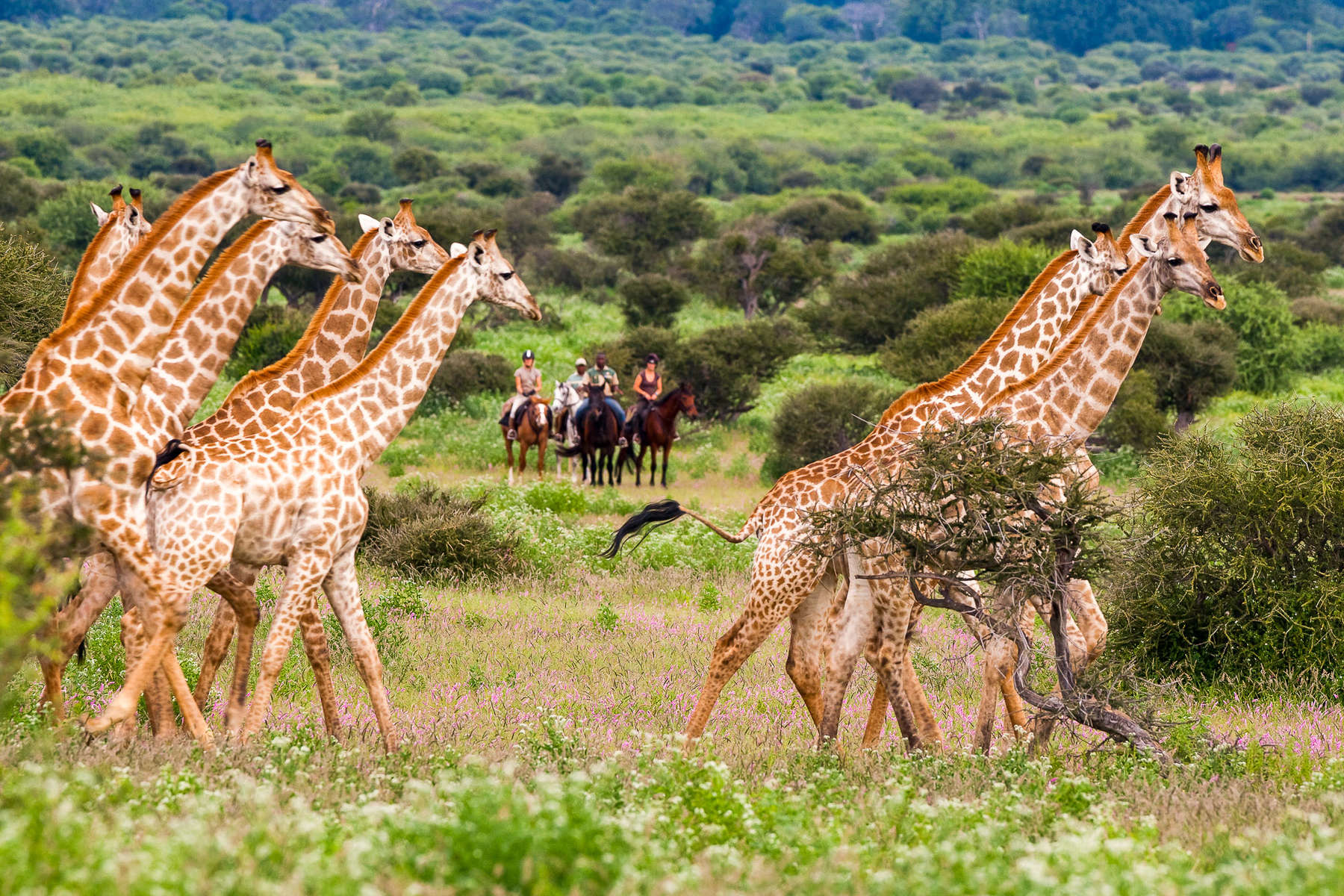
From the horse’s mouth
-
Tuli Trail SafariJuly 2025 Katherine aged 37This was a once in a lifetime trip, which I now know I will do everything possible to make... not once in a lifetime but something I explore as much as possible! It exceeded all expectations within hour 3 and only got better from there. Scooby was reliable and an absolute joy to ride!
-
Tuli Trail SafariMay 2025 Diane aged 74AMAZING! CAESAR - RESPONSIVE, WILLING, FRIENDLY
-
Tuli Trail SafariOctober 2022 Lucy Dominique aged 39A wonderful horseback safari staying at three different but fantastic camps. Brilliant guides, great food and my horse was a gem even if he was a little scared of the elephants! Olivera is a great little Boerperd. He was forward going but polite to stop after our many canters along with the giraffe! Sharp and... Read all
-
Tuli Trail SafariJuly 2022 Sean aged 49Other people on the safari who didn't use Equus Journeys and were unhappy with their booking experience, will be using Equus Journeys for their next trip!
-
Tuli Trail SafariJuly 2022 Jennifer aged 51Thoroughly enjoyed the trip and would definitely recommend it. The guides especially West were brilliant and the support staff, in particular the ladies who cooked and looked after us were exceptional. I rode Hotshot - 6yr old, very responsive although you had to encourage him to leave the group which was OK if you... Read all
-
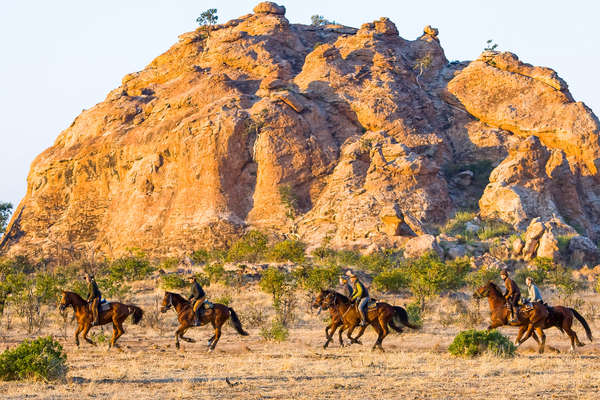
Discover the incredible scenery of the Tuli block -
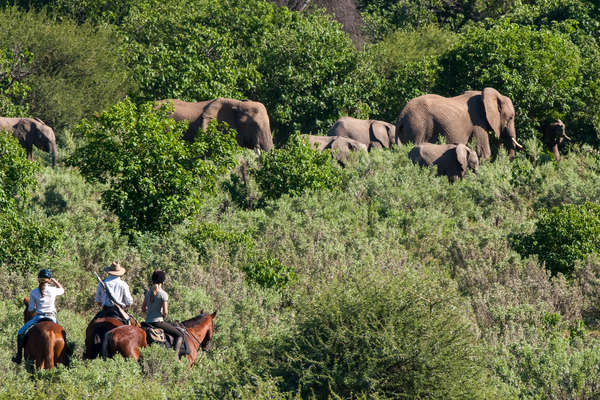
The reserve is known for its large herds of eles -
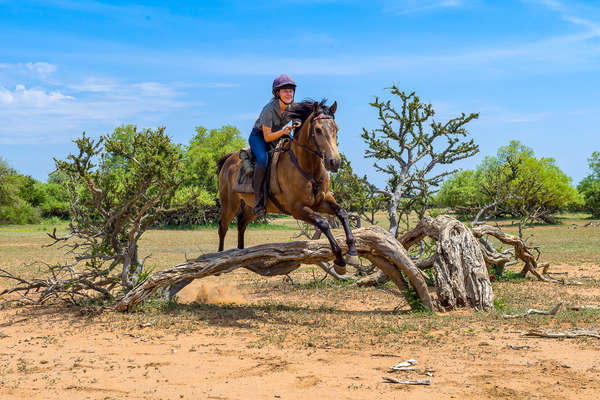
Enjoy the occasional jump! -
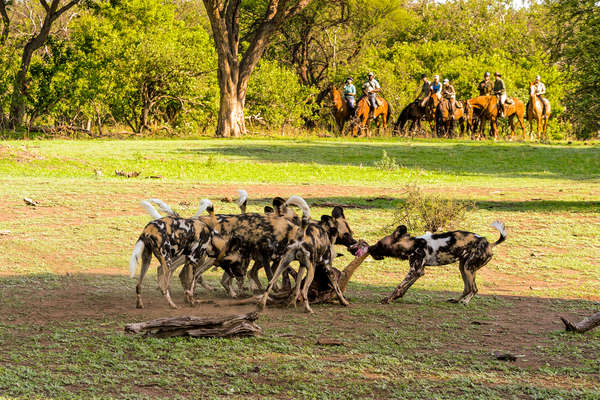
Watching wildlife from the saddle on safari -
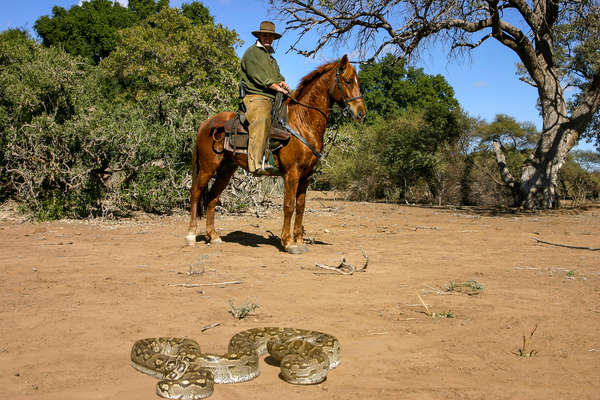
A riding safari in the Tuli block, Botswana -

Watching giraffe on a mobile riding safari -
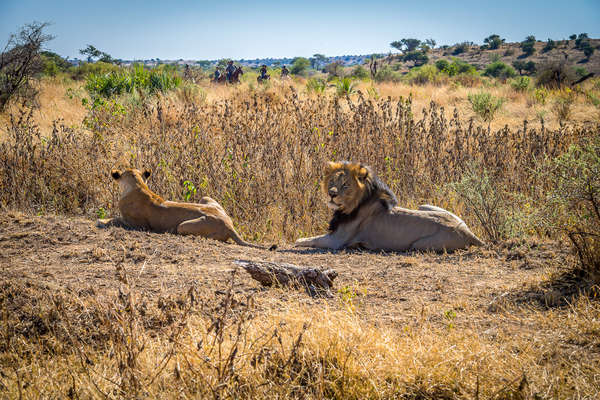
Mashatu game reserve is home to big cats too! -
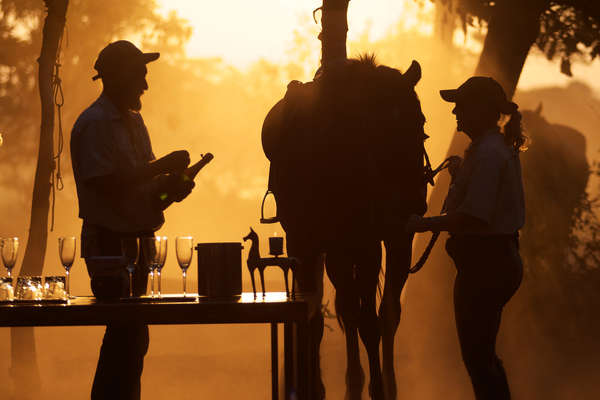
Sundowners after a day in the saddle -
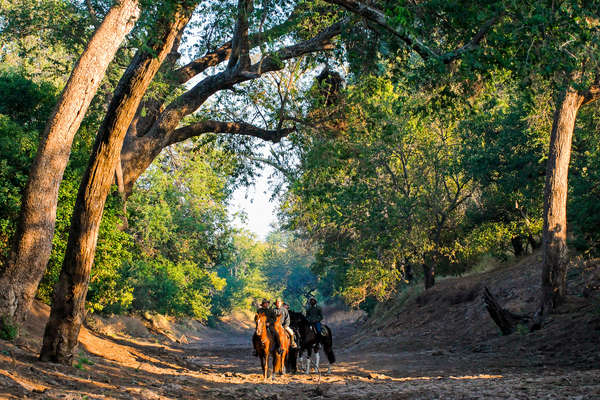
Enjoy the thrills of the Tuli riding safari -

Discover the incredible scenery of the Tuli block -
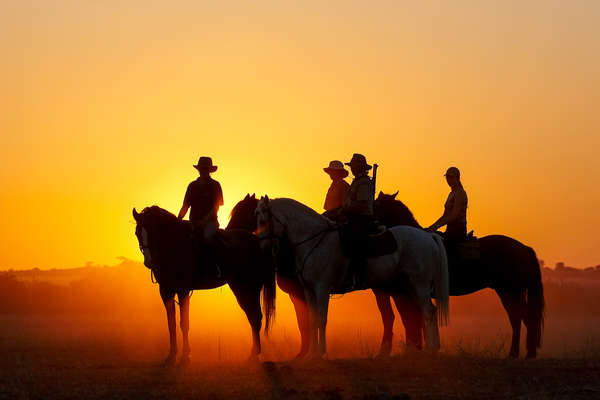
An African sun set... Magical!
Itinerary
Highlights
- The largest population of elephant in southern Africa
- Exceptional horses selected for their temperament and ridability
- Accommodation in three stunning camps, quirky and comfortable
- Afternoon game walks and vehicle drives to view species difficult to approach on horseback, such as lion
- Good game viewing opportunities including lion, leopard, cheetah, wild dog, elephant etc. As the wildlife in this area are not seasonal, wonderful game viewing experiences are possible throughout the year.
- Transfer to Botswana by light aircraft and avoid the long road transfer!
-
Day 1 1 : OVERNIGHT FLIGHT TO JOHANNESBURG
International flight overnight to Johannesburg (Tambo International). You will need to depart tonight from Europe to arrive in Johannesburg the following morning (Day 2).
Flights are not included but they can be booked upon request. -
Day 2 2 : JOHANNESBURG-TWO MASHATUS CAMP - 2 hours riding
Two Mashatu CampYou need to arrive in Johannesburg in the early morning - please see "dates and prices" for exact arrival/departure time.
Please note: the Tuli 1 safari runs with a Saturday safari start (arrival in Johannesburg) and the Tuli 2 safari starts on Mondays. The itinerary for Tuli 2 is slightly different (three nights in Tree Camp and two nights in Two Mashatus) but the overall experience remains the same.
The light aircraft transfer is a journey of approx. 2h and you should ensure that your luggage is packed into soft sided bags so that they fit into the aircraft. Please check the "packing list" for additional luggage restrictions.
After completing Botswanan entry formalities you will be met by your guide and transferred c. 10 mins in an open safari vehicle to the reception area.
After a light lunch, you will head off to the stables to meet your horse for the week. This first ride is your chance to get to know your horse and so if you are not happy then you should notify the guide who will be able to select another horse for you. This is also your chance to get your first glimpse of the Mashatu Game Reserve, home to the largest herd of wild free-roaming elephants on private land in Africa.
After arriving at Two Mashatus Camp there is time for a refreshing drink before dinner served in the Llala Palm dining room. -
Day 3 3 : TREE CAMP - 5 hours riding
Tree Camp MashatuYou will get an early-morning breakfast before going for a morning ride, leaving behind the dense woodland of the Limpopo River. Here is your chance to see a lot of game, and enjoy stunning views on horseback. As the ride traverses the heartland of Mashatu, you will encounter plentiful game: plains game, many giraffe and herd of elephants.
Arrival at the Tree Camp for lunch. This is a very unique and quirky camp overlooking the Majale river, with beautiful tents nestled in the arms of a trees, high up on a platform - 4 meters off the ground! After a quick rest, choose a ride or enjoy your first bush walk exploring the area along the west bank of the Matabole river. Return to the Camp for sundowners on the deck before dinner is served under the stars.
-
Day 4 4 : KGOTLA CAMP - 5 hours riding
Kgotla campYou will enjoy a complete immersion into this gorgeous and sunny area. You will have a chance to race with zebra and gnu across beautiful open plains, making memories for a lifetime. You will witness the ancient rock formations for which the Limpopo Valley is known, and the might Baobab trees that scatter the landscape of the "Land of the Giants". You ride alongside the banks of the Motloutse river, and arrive arrive at Kgotla Camp in time for a late lunch.
In the afternoon, search for the area’s resident lions on a game drive (if available) and draw the day’s adventures to a close with sundowners at the ancient “Amphitheatre” rocks. Back at the Kgotla, dinner is enjoyed around a large log fire. The night is spent with a ceiling of stars and Africa’s night-time melody to sing you to sleep; a rare experience which is just about as far away from city life and the modern world as anyone can imagine.
-
Day 5 5 : KGOTLA CAMP - 4-5 hours riding
Kgotla campThis morning you will explore the sandstone formations including the famed Solomon’s Wall. Ancient civilizations harboured their wealth among these hills where two mighty rivers, the Limpopo and the Motloutse, meet.
There is time in the afternoon to head on a short drive to the archaeologically rich Mmamagwa hills where a 360 degree view of the reserve can be enjoyed as well as another beautiful African sunset. After a short climb, enjoy sundowners beneath a beautiful baobab tree with a breath-taking view of the area.
You will have dinner in Kgotla camp and sleep again under the stars. -
Day 6 6 : TREE CAMP OR KOGTLA CAMP - 5 hours riding
Tree Camp MashatuAfter a light breakfast, test the amazingly sure-footed Boerperds as you cross over basalt ridges following age-old elephant trails and enjoy long sustained canters to make up for the lost time traversing the ridges. After an exhilarating ride through this timeless countryside, a relaxing lunch in the eaves of the Tree Camp is very welcomed.
After an exhilarating ride through this timeless countryside, enjoy a relaxing lunch at Tree Camp. An afternoon ride or bush walk or game drive (if available) exploring the northern banks of the Majele, Matabole and Jwala rivers.
Please note that in the Tuli 2, tonight you will stay at the Kogtla camp, instead of the Tree camp. -
Day 7 7 : TWO MASHATUS CAMP OR TREE CAMP - 5 hours riding
Two Mashatu CampToday the ride roams through the Pitsane River Valley. The day will involve riding up and down river banks, through riverine forest, game sightings and more fabulous photo opportunities. The river is fed by a spring high in the hills and its regular watering holes attract the wildlife, guaranteeing excellent sightings.
The area is steeped in history: the Zeederberg Trail, a stagecoach line that connected the towns of the Transvaal (South Africa) to the newly forged settlements of southern Rhodesia (now Zimbabwe), once traversed theses open plains. The coaches would ford the Limpopo River before trailing the Pitsane River into Zimbabwe. En route there was an old British supply post, Bryce’s Store, which was destroyed here in a skirmish between British and Boer soldiers during the Boer war in 1899. Today bullets, buckles and other remains can be found in the rubble around the store.
Spend the afternoon at leisure - perhaps enjoy the swimming pool - before you embark on a guided walk into the bush followed by dinner around the log fire.
Please note that in the Tuli 2, tonight you will spend at the Tree camp.
-
Day 8 8 : TWO MASHATUS CAMP - 5 hours riding
Two Mashatu CampToday’s ride is rich in history and offers a variety of interesting tales of the past. The open Pitsane plains, so characteristic of this area, are perfect for a faster ride, hopefully with zebra or wildebeest... You head in the direction of the Majale and Limpopo confluence where lunch awaits you upon return to the Mashatus camp.
There is time to relax in camp, before either an afternoon ride or bush walk for your last African sundowner.
Dinner is in the Llala palm rondavel. A dreamless sleep no doubt awaits you as the final day draws to a close. -
Day 9 9 : TWO MASHATUS - LIMPOPO RIVER CAMP - JOHANNESBURG - 3-4 hours riding
Your last day in the savannah! Your final morning is spent riding along the Limpopo River, heading back to the stables where fond farewells are made to your horse and lunch is taken on the river bank.
You will be transferred to the airstrip for your flight back to Johannesburg. Your international flight back home should be in the evening, please check "dates and prices" for exact timings. -
Day 10 10 : ARRIVALS IN EUROPE OR BEGINNING OF YOUR EXTENTION
Dates & prices
Price details
NOTE: In the Tuli you will spend 3 nights at Mashatu, 2 nights in the Tree camp, and 2 nights at Kgotla.
In the Tuli 2, you will spend 2 nights at Mashatu, 2 nights in the Tree camp, and 3 nights at Kgotla.
- Flights to your destination (Johannesburg) are not included but we can assist with this on request
- Rates are per person, based on two riders sharing a twin or double tent.
- The usual group size is a minimum of 2 and a maximum of 8 riders (up to 10 guests maximum including mountain bikers)
- Group air transfers from Johannesburg are not included but are at an additional cost - 2025/2026: £800/€940/$1030
Your flight should arrive into Johannesburg O R Tambo no later than 9:00 am for your 11:00 am meet-up. On the last day, flights should depart after 20:00. It is possible in exceptional circumstances that the light aircraft transfer is replaced by a road transfer.
- There is a conservation levy of $20 per person per night payable on site. This is $140 per person for the Tuli Trail - payable in $, £, € or rands.
- There is no single supplement if you are willing to share a tent with another rider of the same sex. To guarantee your own tent there is a supplement, as there is only a small number of tents available:
> In 2025 and 2026, this is 25% in the low season, 35% in the mid and high season.
On certain weeks a single tent is available on a first-come, first-served basis at no extra cost. Please contact us for details. Please note there is no single accommodation at Kgotla camp or Tree Camp due to the nature of the camp
- Non-riders have the option to go on a cycling safari. A relaxed ride could cover 15- 25km on a morning ride, more advanced riders could cover up to 40km per day. The pace is generally easy going with regular game sightings, and a scenic picnic stop with an option to opt out of the ride at the mid-morning break if preferred.
- You may be on safari with Mountain Bike riders. However, the two groups separate each morning with their own guides and meet again in time for lunch and normally enjoy all afternoon activities together.
- Game drives in the Kgotla Area on the Tuli Safaris are included. Additional game Drive with Mashatu guides in the central area of the reserve are an additional $87 pp and are subject to availability.
- For this ride, there is a maximum rider weight of 85 kilos, 187 lbs, 13.3 st. If you weigh more than this, please contact us and we will advise on a case-by-case basis.
- Age restrictions: Children under 16 please enquire, strictly no under 12’s.
Please Note
The itinerary may be modified at anytime for security reasons, meteorological or events beyond our control such as blocked roads, rivers in flood, drought, strikes and local holidays. Equus Journeys, our local partners and their local guides will always strive to find the best solution and will alter the itinerary as needed.
The names of the hotels and accommodation are given for information only and depending on availability, they may be modified without notice and replaced by another of a similar standard.
Price includes
Support Team
1 backup guide
Logistics
1 horse equipped with saddle and bridle per rider
4 grooms for 8 riders
1 logistics manager
Accommodation
Meals
All the drinks including wines and cocktails
Additional equipment
Extras
Price doesn't include
Meals
Transports
International flights bookable on request
Extras
Tips to the local team
Insurance
Cancellation and travel insurance are not included in the above listed price. Please note that insurance is mandatory. We recommend taking out an insurance policy as soon as your trip is booked to cover you in case of cancellation
Optional
Accommodation
-
Departure Return Price without flights Status 16/01/2026 25/01/2026 £3,062 €3,491 $3,950 Contact an advisor 18/01/2026 27/01/2026 £3,062 €3,491 $3,950 23/01/2026 01/02/2026 £3,062 €3,491 $3,950 25/01/2026 03/02/2026 £4,295 €4,896 $5,541 30/01/2026 08/02/2026 £4,295 €4,896 $5,541 01/02/2026 10/02/2026 £3,625 €4,133 $4,676 06/02/2026 15/02/2026 £3,625 €4,133 $4,676 Book now 13/02/2026 22/02/2026 £3,625 €4,133 $4,676 Book now 15/02/2026 24/02/2026 £3,625 €4,133 $4,676 Book now 20/02/2026 01/03/2026 £3,625 €4,133 $4,676 27/02/2026 08/03/2026 £4,295 €4,896 $5,541 -
Departure Return Price without flights Status 01/03/2026 10/03/2026 £4,295 €4,896 $5,541 Book now 06/03/2026 15/03/2026 £4,295 €4,896 $5,541 08/03/2026 17/03/2026 £4,295 €4,896 $5,541 13/03/2026 22/03/2026 £4,295 €4,896 $5,541 20/03/2026 29/03/2026 £4,295 €4,896 $5,541 22/03/2026 31/03/2026 £4,295 €4,896 $5,541 Book now 27/03/2026 05/04/2026 £4,295 €4,896 $5,541 Book now 03/04/2026 12/04/2026 £4,295 €4,896 $5,541 Book now 05/04/2026 14/04/2026 £4,295 €4,896 $5,541 Book now 10/04/2026 19/04/2026 £4,295 €4,896 $5,541 17/04/2026 26/04/2026 £4,295 €4,896 $5,541 Book now 24/04/2026 03/05/2026 £4,295 €4,896 $5,541 Book now 26/04/2026 05/05/2026 £4,295 €4,896 $5,541 Book now -
Departure Return Price without flights Status 01/05/2026 10/05/2026 £4,295 €4,896 $5,541 08/05/2026 17/05/2026 £4,295 €4,896 $5,541 Book now 15/05/2026 24/05/2026 £4,295 €4,896 $5,541 17/05/2026 26/05/2026 £4,295 €4,896 $5,541 Book now 22/05/2026 31/05/2026 £4,295 €4,896 $5,541 Book now 29/05/2026 07/06/2026 £4,295 €4,896 $5,541 Book now 31/05/2026 09/06/2026 £4,295 €4,896 $5,541 Book now 05/06/2026 14/06/2026 £4,295 €4,896 $5,541 Book now 12/06/2026 21/06/2026 £4,295 €4,896 $5,541 Book now 14/06/2026 23/06/2026 £4,295 €4,896 $5,541 Book now 19/06/2026 28/06/2026 £4,295 €4,896 $5,541 Book now 26/06/2026 05/07/2026 £4,295 €4,896 $5,541 Book now 28/06/2026 07/07/2026 £4,295 €4,896 $5,541 Book now -
Departure Return Price without flights Status 03/07/2026 12/07/2026 £4,295 €4,896 $5,541 10/07/2026 19/07/2026 £4,295 €4,896 $5,541 Book now 12/07/2026 21/07/2026 £4,295 €4,896 $5,541 Book now 17/07/2026 26/07/2026 £4,295 €4,896 $5,541 24/07/2026 02/08/2026 £4,295 €4,896 $5,541 Book now 26/07/2026 04/08/2026 £4,295 €4,896 $5,541 Book now 31/07/2026 09/08/2026 £4,295 €4,896 $5,541 Book now 07/08/2026 16/08/2026 £4,295 €4,896 $5,541 Book now 09/08/2026 18/08/2026 £4,295 €4,896 $5,541 Book now 14/08/2026 23/08/2026 £4,295 €4,896 $5,541 Book now 21/08/2026 30/08/2026 £4,295 €4,896 $5,541 Book now 23/08/2026 01/09/2026 £4,295 €4,896 $5,541 Book now 28/08/2026 06/09/2026 £4,295 €4,896 $5,541 Book now -
Departure Return Price without flights Status 04/09/2026 13/09/2026 £4,295 €4,896 $5,541 06/09/2026 15/09/2026 £4,295 €4,896 $5,541 Book now 11/09/2026 20/09/2026 £4,295 €4,896 $5,541 Book now 18/09/2026 27/09/2026 £4,295 €4,896 $5,541 Book now 20/09/2026 29/09/2026 £4,295 €4,896 $5,541 Book now 25/09/2026 04/10/2026 £4,295 €4,896 $5,541 Book now 02/10/2026 11/10/2026 £4,295 €4,896 $5,541 Book now 04/10/2026 13/10/2026 £4,295 €4,896 $5,541 Book now 09/10/2026 18/10/2026 £4,295 €4,896 $5,541 16/10/2026 25/10/2026 £4,295 €4,896 $5,541 Book now 18/10/2026 27/10/2026 £4,295 €4,896 $5,541 Book now 23/10/2026 01/11/2026 £4,295 €4,896 $5,541 Book now 30/10/2026 08/11/2026 £4,295 €4,896 $5,541 Book now -
Departure Return Price without flights Status 01/11/2026 10/11/2026 £4,295 €4,896 $5,541 06/11/2026 15/11/2026 £4,295 €4,896 $5,541 Book now 13/11/2026 22/11/2026 £4,295 €4,896 $5,541 Book now 15/11/2026 24/11/2026 £4,295 €4,896 $5,541 Book now 20/11/2026 29/11/2026 £4,295 €4,896 $5,541 Book now 27/11/2026 06/12/2026 £4,295 €4,896 $5,541 Book now 29/11/2026 08/12/2026 £4,295 €4,896 $5,541 Book now 04/12/2026 13/12/2026 £3,062 €3,491 $3,950 Book now 11/12/2026 20/12/2026 £3,062 €3,491 $3,950 Book now 13/12/2026 22/12/2026 £3,062 €3,491 $3,950 Book now 18/12/2026 27/12/2026 £3,062 €3,491 $3,950 Book now 25/12/2026 03/01/2027 £3,062 €3,491 $3,950 Book now 27/12/2026 05/01/2027 £3,062 €3,491 $3,950 Book now
Equestrian info
Horses
You will be matched with a horse for the week, with the possibility to swap if you feel like this isn't the best match after the first day.
Guide & local team
Minimum riding ability
Minimum riding ability
Important: On the very first day, all riders will be asked to participate in a short riding assessment. Riders who do not make it through will be offered shorter rides daily from the main stables.
For this ride, there is a maximum rider weight of 85 kilos, 187 lbs, 13.3 st. If you weigh more than this, please contact us and we will advise on a case-by-case basis.
Pace
Tacking ability and participation
Trip conditions and Requested experience
Guests who do not ride regularly are requested to get fit prior to the ride. It is of particular importance to ensure you are comfortable and balanced when riding at speed across rough terrain and open spaces. If the guides feel that you are unsafe on horseback, then you will be offered non-riding activities instead.
Please check with us before booking if you have any medical conditions as you will be far from medical help.
Please note: You may be on safari with Mountain Bike riders, however the two groups separate each morning with their own guides and meet again in time for lunch and normally enjoy all afternoon activities together.
Equestrian equipment
We recommend our riders to wear a helmet to the correct standard and you should bring your own to ensure a proper fit. Helmets are mandatory on this safari.
Travel info
Comfort
Three nights at Two Mashatus camp : this camp is situated close to the Limpopo river. Four large walk-in tents are pitched on teak platforms with ensuite enviro-loo and hot shower. Each tent is private and positioned in the shade of a tree with a small deck area on which to relax during the afternoons. Traditionally built Lala palm rondavels serve as dining area and lounge. Small plunge pool available.
Two nights in Kgotla camp: the Kgotla is an old tribal court from a nearby community that was relocated to the banks of the Motloutse River on the western periphery of Mashatu. The boma is an open-air traditional African enclosure made up of leadwood logs. There is hot running water, beautiful open-air showers and flushing toilets; the perfect combination of necessary comforts and an authentic bush experience. Guests sleep on beds around a large log fire which sits on a hearth in the centre of the boma.
Two nights at Tree Camp: A unique camp built 4 meters above the ground, around the boughs of an ancient Mashatu tree and two lead wood trees. Overlooking the banks of the Majale River, this spot offers a spectacular panoramic view of the adjacent cliffs and flood plain opposite where Mashatu's legendary elephant herds roam. Five beautiful, spacious canvas roofed areas house four poster beds and classic antique furniture. There is a separate area for showers and toilets. There is a spacious dining and lounge area on the elevated platform for relaxing.
No Wi-Fi or mobile reception.
Tuli Safari offers a laundry service twice a week from either Tree Camp or Two Mashatus. There are no driers so in case of rain they cannot guarantee a 24h turnaround.
Note privacy is minimal at Kgotla and Tree camps!
Meals
Lunch is also light and may be quiche and salad or a variety of salads with cold meats.
High tea in the afternoon with a selection of drinks and freshly baked cakes.
Dinner is three courses. Wine is served with the meals and a selection of drinks are available.
Vegetarians and special diets can be catered for with advance notice.
Climate
Summer (Nov - March) is hot and there is the chance of dramatic thunderstorms.
Tips
If you wish to tip your guide separately then you may do so.
Packing list
Please note: in the case of a light aircraft transfer, remember that planes don't necessarily have a separate luggage compartment, and carry-on regulations may apply. The weight limit is 18 kg and 5 kg for your carry-on. Remember that safari camps provide shampoo and soap, as well as alcohol, so make sure to pack accordingly. Please remember soft bags only are accepted, hard-sided luggage will not be accepted on the plane. Luggage type and weight:
- Maximum luggage weight is 18 kg/35 lbs, 40 cm x 30 cm x 60 cm (Soft luggage/duffle with 1 flat side only, and no protruding wheels).
- Hand luggage is 5 kg/11 lbs (1 soft piece)
- You can also have your “ladies” handbag with you - but please limit the size and do not try to squash extra clothing/equipment inside them. The charter planes are much smaller than normal planes and thus have limited space.
- Power banks = only 1 per person and must be carried with you on your person and not be in any of your bags. This way any overheating Lithium ion batteries/powerbanks will be immediately identified and disposed of to avoid an inflight fire – this is a safety aspect.
- Riding helmets can be carried on the flight with you
Please limit the size of them and not try to squash extra clothing/equipment inside them. The charter planes are much smaller than normal planes and thus have limited space.
Should your luggage exceed these limitations, you will not be able to load it. Excess luggage remains the responsibility of the passenger.
The planes don't necessarily have a separate luggage compartments, and carry-on regulations may apply. Remember that safari camps provide shampoo and soap, as well as alcohol, so make sure to pack accordingly.
Liquid Restrictions:
Perfume- 50ml
Eau de Toilette – (250 ml)
Non-flammable and Non-alcoholic liquids – 500ml per container. A combined total of no more than 2l in checked bags.
Pocket knifes/Leatherman’s and other sharp objects:
These need to be packed into passengers checked bags and will not be allowed in carry-on bags.
- Please don't take a hard sided suitcase. Your luggage should be soft sided, particularly for light air transfers. See above.
- Wherever possible you should wear neutral colours, such as beige, brown or natural bush colours for riding as bright colours, such as red, yellow or white can startle the wildlife and they will see you long before you've seen them
- We recommend travelling in your riding boots and carrying your hat and some riding clothes in your hand luggage - then if your luggage goes astray you are still able to ride!
- Laundry service is provided
Head
- You will be required to wear a hard hat when riding and you should take your own to ensure a correct fit.
- Sunhat for when not riding
- Sunglasses - with a cord attached so they don't fly off when riding
- Buff or bandana
Upper body
- Long sleeved shirts provide protection from the sun and thorns
- T-shirts
- Fleece, jumper or jacket - the evenings can be cold, particularly June - August
- Waterproof jacket - the rains can be difficult to foresee and it's better to be prepared. Rain is more likely Oct-April
- Casual clothes for the evening
Legs
- Lightweight, comfortable riding trousers or jodhpurs - we recommend riding in them at home before taking them on holiday to ensure they don't rub
- Shorts for lazy lunchtimes
- Casual clothes for the evening
Hands and Feet
- Comfortable riding boots. We recommend short boots with half chaps but you may wish to take long chaps to protect against thorns. We don't recommend taking your favourite long leather boots in case they get damaged
- Sandals, flip-flops or trainers for moving around the lodge and camp
- Gloves - your hands are particularly exposed to the sun whilst riding
Nightwear
Other useful items
- Swimsuit - for plunge pools
- Binoculars for viewing game
- Camera and high capacity memory card. Spare battery
- Bumbag for carrying your camera and small items whilst riding
- Headtorch or small torch for moving around camp at night
In your luggage
- Any liquids, such as shampoo, moisturiser, deodorant unless they are less than 100ml and all bottles can fit in a small, clear, plastic ziplock bag. Some toiletries are provided by the camps so you can pack lighter.
In your hand luggage
- Any valuables, such as your camera, ipod, ipad etc.
- Your riding hat
Medical kit
- Sunscreen and lip balm - must be high factor
- Insect repellent, preferably containing deet
- Any medication you regularly take
- Blister plasters in case of any rubs
- Antiseptic cream, plasters, aspirin, anti-histamine, insect-bite salve etc...
- Spare prescription glasses/contact lenses
- Anti malarial tablets and Yellow Fever Certificate if required (check with your doctor)
Sustainable tourism
- Travel light. It's a little known fact, but the lighter you pack, the better for the environment as heavy bags will produce higher emissions (when flying a plane or driving a car!).
- Reduce plastic waste. Take your favorite reusable bottle with you. Avoid single-use bags, cups, or straws.
- Preserve nature. Always take your rubbish with you during the ride and recycle them. Leave all the flowers or plants as you found them, and never get too close when observing wildlife. Make sure to use eco-friendly products such as body wash or laundry detergent (if camping) to protect both your skin and the environment.
- Choose your experiences carefully. Respect animal life by not participating in any activities that abuse wild animals (shows, elephant rides, etc.).
- Support local populations. Buy local handicrafts, be respectful of customs, and learn about the culture of local communities.
- Share! Raise awareness among your family and friends about sustainable tourism.
Did you know?
Did you know?
Mashatu
Game Reserve
The
Tuli Trail mobile safari takes place in the beautiful Mashatu Game reserve in south-eastern
Botswana, where Botswana, South Africa and Zimbabwe converge.
The
reserve is home to a large population of big cats, antelopes and especially elephants
which you will hopefully see whilst riding with your experienced guide. The landscape is extraordinarily
diverse with vast open plains, rocky hills, standstone ridges and marshland. Mashatu,
the "Land of Giants", takes its name from the giant Mashatu trees and
large herds of elephants - the reserve is home to the largest elephant
population on a private reserve on the African continent.
The Mashatu
reserve in Botswana is the perfect place to rediscover what life should be
like: simple, beautiful and vast. Your mobile riding safari through the
reserve is an extraordinary adventure: prepare to discover Africa at its
finest!
On the blog
Customer reviews
Customer reviews
-
Katherine aged 37 West Hollywood 1 tripJuly 2025This was a once in a lifetime trip, which I now know I will do everything possible to make... not once in a lifetime but something I explore as much as possible! It exceeded all expectations within hour 3 and only got better from there. Scooby was reliable and an absolute joy to ride!
-
Horses
-
Programme
-
Accommodation
-
Local guide
-
-
Diane aged 74 GLOUCESTER 1 tripMay 2025AMAZING! CAESAR - RESPONSIVE, WILLING, FRIENDLY
-
Horses
-
Programme
-
Accommodation
-
Local guide
-
-
Lucy Dominique aged 39 NUTLEY 2 tripsOctober 2022A wonderful horseback safari staying at three different but fantastic camps. Brilliant guides, great food and my horse was a gem even if he was a little scared of the elephants! Olivera is a great little Boerperd. He was forward going but polite to stop after our many canters along with the giraffe! Sharp and... Read all
-
Horses
-
Programme
-
Accommodation
-
Local guide
-
-
Sean aged 49 Boyle 1 tripJuly 2022Other people on the safari who didn't use Equus Journeys and were unhappy with their booking experience, will be using Equus Journeys for their next trip!
-
Horses
-
Programme
-
Accommodation
-
Local guide
-
-
Jennifer aged 51 Boyle 1 tripJuly 2022Thoroughly enjoyed the trip and would definitely recommend it. The guides especially West were brilliant and the support staff, in particular the ladies who cooked and looked after us were exceptional. I rode Hotshot - 6yr old, very responsive although you had to encourage him to leave the group which was OK if you... Read all
-
Horses
-
Programme
-
Accommodation
-
Local guide
-
-
Joseph Gerald aged 59 VANCOUVER 2 tripsJune 2022Exceeded my expectations! Quality of food A++, volume of animals encountered 5x what I expected. quality of horses was fantastic! Steady under all conditions and never spooked. I felt totally safe and in control in all situations. Accommodations were great and the guides very knowledge able. Lots of attention to the... Read all
-
Horses
-
Programme
-
Accommodation
-
Local guide
-
-
Karen aged 60 Pulborough 3 tripsJuly 2019There really aren't words good enough to review this trip. It was totally amazing and exceeded my expectations 100 fold. There really wasn't anything missing and the team of people and horses in Botswana go above and beyond to ensure you get everything you can from it. I would urge anyone thinking about it to just DO... Read all
-
Horses
-
Programme
-
Accommodation
-
Local guide
-
-
Elayne Louise aged 55 ELMSWELL 3 tripsJuly 2019Absolutely fantastic experience, would highly recommend this to anyone interested in a riding safari! Started with Rodeo who I wasn't happy with as he had wasted muscle on his offside hindquarter that I found made him very uncomfortable. Was then given Prisma, perfect for me.
-
Horses
-
Programme
-
Accommodation
-
Local guide
-
-
Elke Hilda H. aged 45 ANTWERPEN 2 tripsJuly 2018An thrilling experience in a amazing part of Africa, awesome game viewing and a level of quality (allround: accomodation, horse riding, meals, organisation, knowledge of guides) I have never experienced on any other trail I did before. First horse in Botswana was not a very succesfull match (Big Red). the hole day... Read all
-
Horses
-
Programme
-
Accommodation
-
Local guide
-

